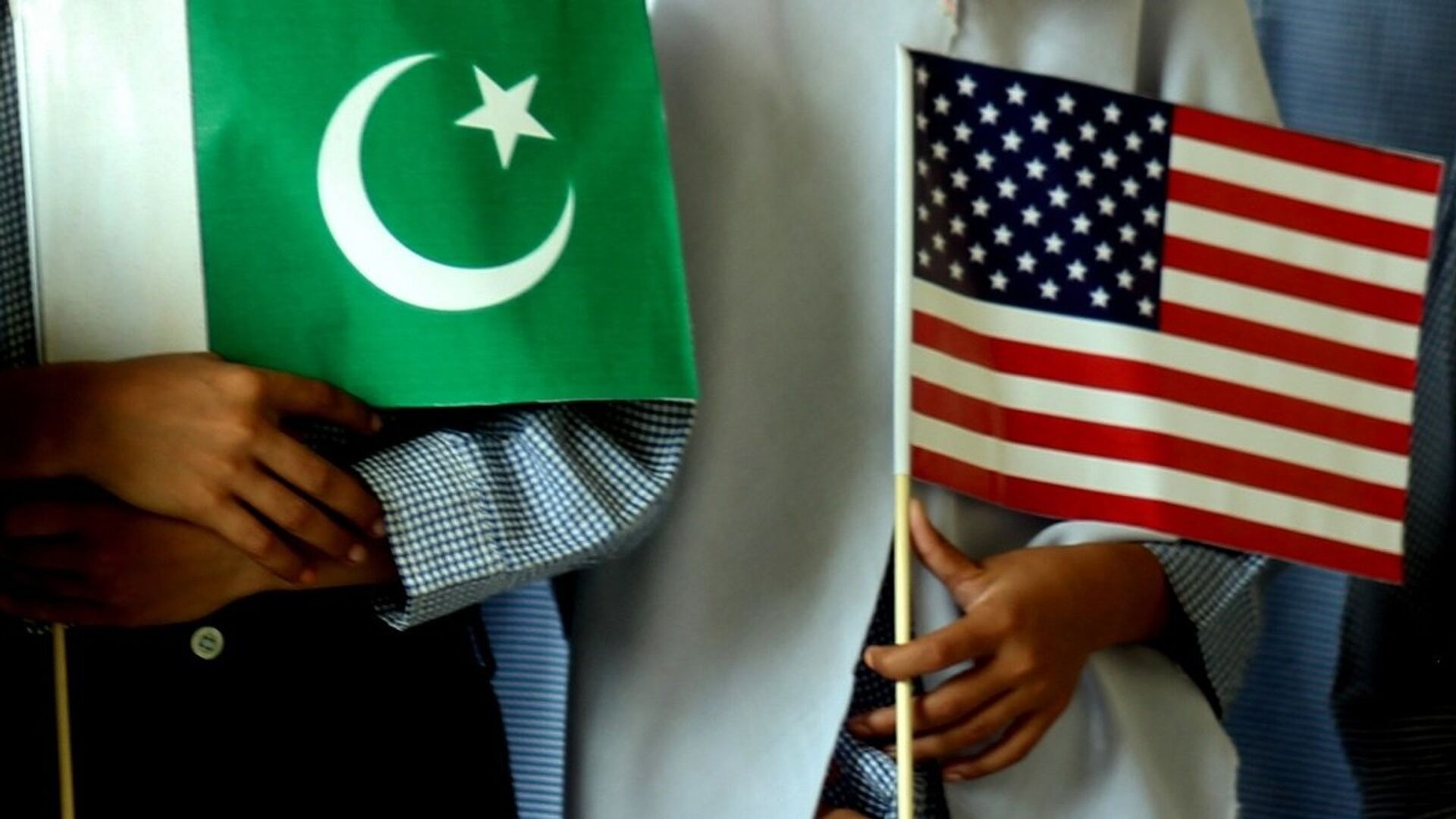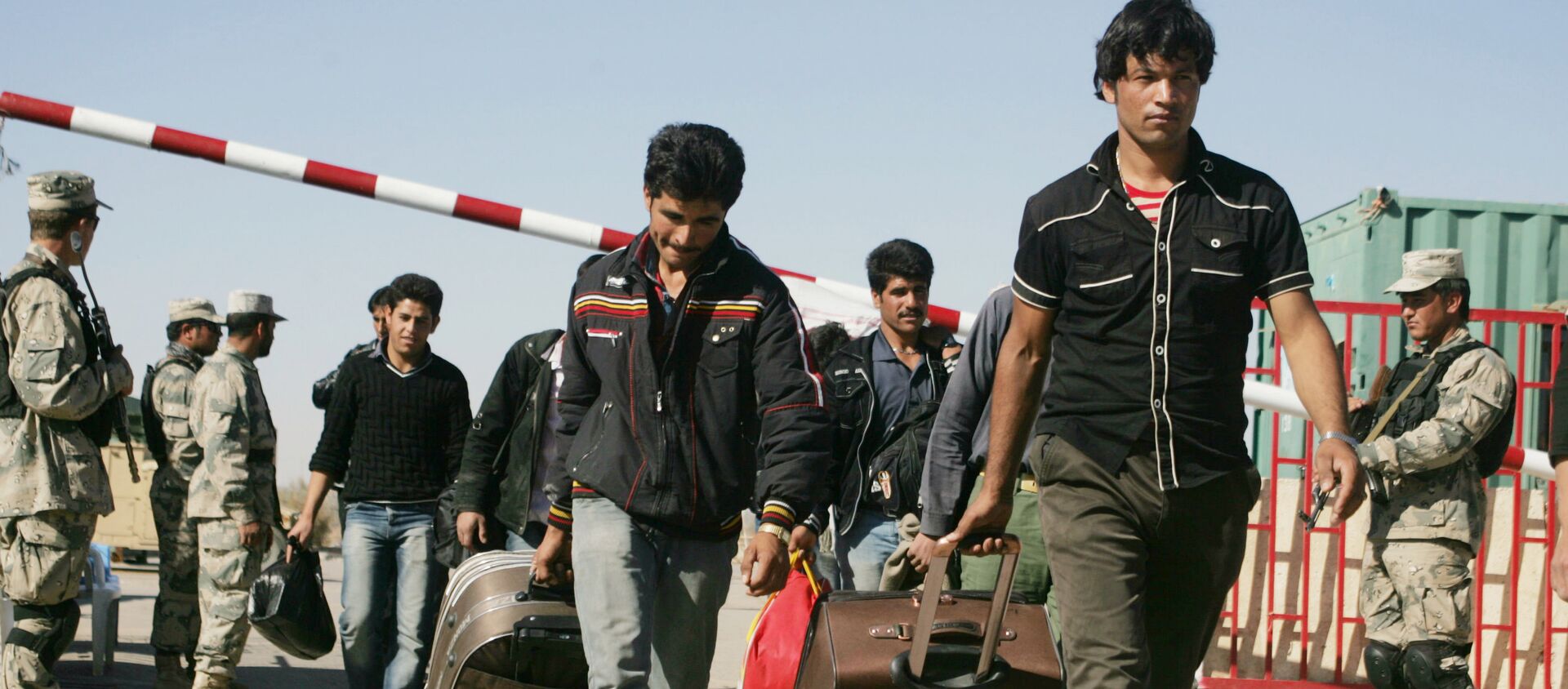https://sputnikglobe.com/20211010/us-deputy-secretary-of-state-says-wh-unwilling-to-build-broad-relationship-with-pakistan-1089816146.html
US Deputy Secretary of State Says WH Unwilling to Build 'Broad Relationship With Pakistan'
US Deputy Secretary of State Says WH Unwilling to Build 'Broad Relationship With Pakistan'
Sputnik International
Over the past few months, both sides have sparred over Afghanistan-related issues, with Pakistani Prime Minister Imran Khan in August harshly criticising the... 10.10.2021, Sputnik International
2021-10-10T15:50+0000
2021-10-10T15:50+0000
2022-10-26T11:59+0000
pakistan
wendy sherman
imran khan
afghanistan
news
troops
withdrawal
relationship
us
world
https://cdn1.img.sputnikglobe.com/img/107550/60/1075506095_29:0:1204:661_1920x0_80_0_0_472324ecd08970be94c2e73fa5ca5d17.jpg
US Deputy Secretary of State Wendy Sherman's recent visit to Islamabad was apparently overshadowed by the fact that even though she sat down with Pakistani Foreign Minister Shah Mehmood Qureshi and other senior officials, talks with Prime Minister Imran Khan did not materialise.This was preceded by Sherman making it clear that her trip to Islamabad would only be for a specific and narrow purpose", namely to talk about Afghanistan and the Taliban*. Sherman added that "we all need to know what's going on in Afghanistan" and "[…] to be of one mind in the approach to the Taliban".Sherman's remarks came after Blinken last month accused Pakistan of "hedging its bets constantly about the future of Afghanistan" by supporting Washington in its anti-terror operations in the country, while harbouring terrorists during the 20-year "War on Terror".Blinken then reiterated his list of demands for the Taliban-led interim Afghan government, which includes not allowing Afghanistan to be used as a safe haven for "outward directed terrorism", and upholding the rights of women as preconditions before the US and its partners would move towards recognising the recently unveiled cabinet in Kabul.The top US diplomat spoke after Pakistani Foreign Minister Qureshi called for "discarding old lenses, [and] developing new insights" as well as proceeding with a pragmatic approach in dealing with the new developments in Afghanistan.In another development in July, Prime Minister Khan insisted that he was not concerned about US President Joe Biden not picking up the phone and calling him despite the Afghan crisis.In another sign of bilateral tensions, in May, Khan slammed the US strategy in Afghanistan, claiming "the Americans should have started negotiations with the Taliban from a position of strength when there were 150,000 NATO troops on the ground. That was the time to talk to the Taliban".Earlier in May, the US announced that it was pulling its troops out of Afghanistan after a nearly 20-year presence in the country, setting the end of August as the deadline. After the announcement, Taliban militants launched a major nationwide offensive to capture key towns and cities, something that ended with the Taliban seizing power in Afghanistan on 15 August, two weeks before the completion of the US-led coalition's exit from the country.*The Taliban is a terrorist group banned in Russia and a number of other countries.
https://sputnikglobe.com/20210805/us-demands-pakistan-keeps-its-borders-open-for-afghan-refugees-to-implement-new-resettlement-plan-1083533092.html
pakistan
afghanistan
world
Sputnik International
feedback@sputniknews.com
+74956456601
MIA „Rosiya Segodnya“
2021
Oleg Burunov
https://cdn1.img.sputnikglobe.com/img/07e4/09/0b/1080424846_0:0:2048:2048_100x100_80_0_0_3d7b461f8a98586fa3fe739930816aea.jpg
Oleg Burunov
https://cdn1.img.sputnikglobe.com/img/07e4/09/0b/1080424846_0:0:2048:2048_100x100_80_0_0_3d7b461f8a98586fa3fe739930816aea.jpg
News
en_EN
Sputnik International
feedback@sputniknews.com
+74956456601
MIA „Rosiya Segodnya“
Sputnik International
feedback@sputniknews.com
+74956456601
MIA „Rosiya Segodnya“
Oleg Burunov
https://cdn1.img.sputnikglobe.com/img/07e4/09/0b/1080424846_0:0:2048:2048_100x100_80_0_0_3d7b461f8a98586fa3fe739930816aea.jpg
pakistan, wendy sherman, imran khan, afghanistan, news, troops, withdrawal, relationship, us, world
pakistan, wendy sherman, imran khan, afghanistan, news, troops, withdrawal, relationship, us, world
US Deputy Secretary of State Says WH Unwilling to Build 'Broad Relationship With Pakistan'
15:50 GMT 10.10.2021 (Updated: 11:59 GMT 26.10.2022) Over the past few months, both sides have sparred over Afghanistan-related issues, with Pakistani Prime Minister Imran Khan in August harshly criticising the "hasty" manner in which the US was pulling its troops out of the war-ravaged nation at the time.
US Deputy Secretary of State Wendy Sherman's recent visit to Islamabad was apparently overshadowed by the fact that even though she sat down with Pakistani Foreign Minister Shah Mehmood Qureshi and other senior officials, talks with
Prime Minister Imran Khan did not materialise.
This was preceded by Sherman making it clear that her trip to Islamabad would only be for a specific and narrow purpose", namely to talk about Afghanistan and the Taliban*.
"We [the US] don't see ourselves building a broad relationship with Pakistan, and we have no interest in returning to the days of hyphenated India-Pakistan. That's not where we are. That's not where we're going to be", she told reporters during her visit to India earlier this week.
Sherman added that "we all need to know what's going on in Afghanistan" and "[…] to be of one mind in the approach to the Taliban".
"We all need to make sure that we have the capabilities that we need to ensure everybody's security, including India's, of course. So I am going to have some very specific conversations, continuing conversations that Secretary (Antony) Blinken has had [with Pakistan]", she added, referring to Blinken's meeting with Pakistani Foreign Minister Qureshi on the sidelines of the UN General Assembly in New York last month.
Sherman's remarks came after Blinken last month accused Pakistan of "hedging its bets constantly about the future of Afghanistan" by supporting Washington in its anti-terror operations in the country, while harbouring terrorists during the 20-year "War on Terror".
"I think you're very right to point at the role that Pakistan has played throughout the past 20 years and even before", stated Blinken, responding to a question from Democratic lawmaker Bill Keating, who accused Islamabad of being "duplicitous" in its dealings with the US.
Blinken then reiterated his list of demands for
the Taliban-led interim Afghan government, which includes not allowing Afghanistan to be used as a safe haven for "outward directed terrorism", and upholding the rights of women as preconditions before the US and its partners would move towards recognising the recently unveiled cabinet in Kabul.
The secretary of state urged Pakistan "to line up with the rest of the international community in working towards those ends and in upholding those expectations".
The top US diplomat spoke after Pakistani Foreign Minister Qureshi called for "discarding old lenses, [and] developing new insights" as well as proceeding with a pragmatic approach in dealing with the new developments in Afghanistan.
In another development in July, Prime Minister Khan insisted that he was not concerned about US President Joe Biden not picking up the phone and calling him despite the Afghan crisis.
"It's his option whether he [Joe Biden] wants to make a call or not. It's his business to think if it is necessary to call or not. It's not like that I am waiting for his call", Khan told reporters at the time.
In another sign of bilateral tensions, in May, Khan slammed
the US strategy in Afghanistan, claiming "the Americans should have started negotiations with the Taliban from a position of strength when there were 150,000 NATO troops on the ground. That was the time to talk to the Taliban".
Earlier in May, the US announced that it was pulling its troops out of Afghanistan after a nearly 20-year presence in the country, setting the end of August as the deadline. After the announcement, Taliban militants launched a major nationwide offensive to capture key towns and cities, something that ended with the Taliban seizing power in Afghanistan on 15 August, two weeks before the completion of the US-led coalition's exit from the country.
*The Taliban is a terrorist group banned in Russia and a number of other countries.





